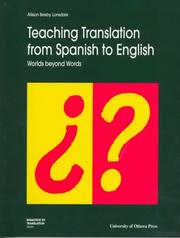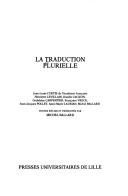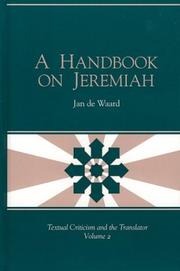| Listing 1 - 6 of 6 |
Sort by
|
Book
ISBN: 9782840162049 2840162040 9791036547539 Year: 2020 Publisher: Nanterre : Presses universitaires de Paris Nanterre,
Abstract | Keywords | Export | Availability | Bookmark
 Loading...
Loading...Choose an application
- Reference Manager
- EndNote
- RefWorks (Direct export to RefWorks)
Des montagnes de l’Asie centrale aux déserts d’Egypte, des rues de Paris au pôle Nord, les agents d’une équipe d’élite mènent une lutte acharnée contre un ennemi redoutable. Disposant des toutes dernières technologies en matière de renseignement et de matériel militaire, ils combattent un puissant marchand d’armes et sa mystérieuse organisation terroriste, qui cherchent à plonger le monde dans le chaos... À première vue, ces paroles semblent faciles à traduire - mais il y a des pièges. Du, de la, des ne sont pas toujours ‘of ’, et mener n’est pas ‘to lead’. Où utiliser le mot ‘the’ ? C’est l’équivalent linguistique d’un dispositif explosif de circonstance. Ce manuel, comme un détecteur de mines, cherche à vous aider à éviter les failles sismiques entre la langue française et la langue anglaise, pour arriver en sécurité à une traduction correcte - sans plonger dans le chaos d’une traduction mot-à-mot.
Français (Langue) --- Franse taal --- Anglais (Langue) --- Vertaalgidsen --- Anglais (langue) --- Traduction en anglais --- Vertalen in het Engels. --- Versions et thèmes --- Frans-Engels. --- Guides pratiques et mémentos. --- Linguistics --- translation --- French language --- English language --- word-for-word --- theme --- mother tongue --- vocabulary
Book
ISBN: 0691069417 1306985153 0691608849 1400863384 9781400863389 9780691069418 9780691608846 Year: 1995 Publisher: Princeton, N.J. Princeton University Press
Abstract | Keywords | Export | Availability | Bookmark
 Loading...
Loading...Choose an application
- Reference Manager
- EndNote
- RefWorks (Direct export to RefWorks)
The recent discovery of fragments from such novels as Iolaos, Phoinikika, Sesonchosis, and Metiochos and Parthenope has dramatically increased the library catalogue of ancient novels, calling for a fresh survey of the field. In this volume Susan Stephens and John Winkler have reedited all of the identifiable novel fragments, including the epitomes of Iamblichos' Babyloniaka and Antonius Diogenes' Incredible Things Beyond Thule. Intended for scholars as well as nonspecialists, this work provides new editions of the texts, full translations whenever possible, and introductions that situate each text within the field of ancient fiction and that present relevant background material, literary parallels, and possible lines of interpretation.Collective reading of the fragments exposes the inadequacy of many currently held assumptions about the ancient novel, among these, for example, the paradigm for a linear, increasingly complex narrative development, the notion of the "ideal romantic" novel as the generic norm, and the nature of the novel's readership and cultural milieu. Once perceived as a late and insignificant development, the novel emerges as a central and revealing cultural phenomenon of the Greco-Roman world after Alexander.Originally published in 1995.The Princeton Legacy Library uses the latest print-on-demand technology to again make available previously out-of-print books from the distinguished backlist of Princeton University Press. These editions preserve the original texts of these important books while presenting them in durable paperback and hardcover editions. The goal of the Princeton Legacy Library is to vastly increase access to the rich scholarly heritage found in the thousands of books published by Princeton University Press since its founding in 1905.
Classical Greek literature --- Greek fiction --- Lost literature --- Roman grec --- Oeuvres perdues (Littérature) --- History and criticism --- Translations into English --- Histoire et critique --- Traduction en anglais --- Traductions en anglais --- -Greek fiction --- -Lost literature --- Greek literature --- Literature --- Greek fiction. --- History and criticism. --- Translations into English. --- Oeuvres perdues (Littérature) --- Greek fiction - Translations into English --- Greek fiction - History and criticism --- Lost literature - Greece

ISBN: 0776616994 077660399X Year: 1996 Publisher: Ottawa, Ont. University of Ottawa Press
Abstract | Keywords | Export | Availability | Bookmark
 Loading...
Loading...Choose an application
- Reference Manager
- EndNote
- RefWorks (Direct export to RefWorks)
While many professional translators believe the ability to translate is a gift that one either has or does not have, Allison Beeby Lonsdale questions this view. In her innovative book, she demonstrates how teachers can guide their students by showing them how insights from communication theory, discourse analysis, pragmatics, and semiotics can illuminate the translation process. Using Spanish to English translation as her example, she presents the basic principles of translation through 29 teaching units, which are prefaced by objectives, tasks, and commentaries for the teacher, and through 48 task sheets, which show how to present the material to students.
Spanish language --- Translating and interpreting --- Translating into English --- Study and teaching (Higher) --- Translation science --- English language --- Didactics of languages --- Didactiek van de talen --- Vertaalkunde --- Engelse taalkunde --- Spaanse taalkunde --- Interpretation and translation --- Interpreting and translating --- Language and languages --- Literature --- Translation and interpretation --- Translators --- Castilian language --- Romance languages --- Translating --- Traduction --- Espagnol (Langue) --- Étude et enseignement (Superieur) --- Traduction en anglais --- translation --- students --- teachers --- Fish measurement --- Semantics --- Semiotics --- Syntax --- United States

ISBN: 2859393323 2757426095 9782859393328 Year: 1990 Publisher: Lille Presses universitaires de Lille
Abstract | Keywords | Export | Availability | Bookmark
 Loading...
Loading...Choose an application
- Reference Manager
- EndNote
- RefWorks (Direct export to RefWorks)
Edmond Cary soulignait l'importance de la traduction à notre époque, son omniprésence dans un monde où se développent les échanges. Depuis la publication de la thèse de Georges Mounin, on a vu se multiplier les travaux dans un domaine devenu un objet d'étude spécifique. Nous vivons une période qui découvre (ou perçoit plus clairement) la richesse des réflexions que l'on peut tirer de cette activité protéiforme. Elle est ici abordée sous cet angle. On y trouvera la relation avec le passé dans l'évocation des traductions de Shakespeare, les projections vers l'avenir avec la traduction automatique et l'utilisation didactique d'analyses d'erreurs et de commentaires de jeux de mots.Mais la traduction est aussi présente dans la diversité de ses formes avec la poésie (Saint-John Perse, Patrick Kavanagh), le théâtre (Pinter, Bond), les dialectes et enfin le fantastique allemand. Nous avons laissé parler chaque genre pour que chacun, à sa manière, laissa paraître ses problèmes et les apporte à la constitution d'une traductologie plurielle.
Theory of literary translation --- English language --- German language --- French language --- Anglais (Langue) --- Allemand (Langue) --- Français (Langue) --- Translating into French. --- Translating into English. --- Traduction en français --- Traduction en anglais --- Translating and interpreting --- Interpretation and translation --- Interpreting and translating --- Language and languages --- Literature --- Translation and interpretation --- Translators --- Translating --- Literaire vertalingen --- Literaire vertalingen. --- Français (Langue) --- Traduction en français --- Congresses --- Translating and interpreting. --- théâtre --- traduction --- poésie --- fantastique --- interprétation --- traduction automatique

ISBN: 1575065312 9781575065311 1575060574 9781575060576 Year: 2021 Publisher: University Park, PA
Abstract | Keywords | Export | Availability | Bookmark
 Loading...
Loading...Choose an application
- Reference Manager
- EndNote
- RefWorks (Direct export to RefWorks)
This new work is a companion volume to de Waard’s work on Isaiah, published in collaboration with the United Bible Societies. The volume moves section by section through the Book of Jeremiah to analyze textual problems and present exegetical solutions.
Bible. --- Jeremiabuch --- Jeremiah (Book of the Old Testament) --- Jérémie (Book of the Old Testament) --- Livre de Jérémie --- Yirmeyah (Book of the Old Testament) --- Yirmeyahu (Book of the Old Testament) --- Criticism, Textual. --- Translating. --- 224.3 --- 225.08*01 --- Jeremias. Lamentationes. Klaagliederen --- Theologie van het Nieuwe Testament: God (Godsleer) --- 225.08*01 Theologie van het Nieuwe Testament: God (Godsleer) --- HISTORY / Ancient / General. --- traduction en anglais --- critique textuelle --- "Bible. AT. Jeremie" --- "Bible. AT. Jeremie." --- Bible --- Traduction. --- Critique textuelle.
Book
ISBN: 2801109371 9782801109373 Year: 1991 Publisher: Louvain-la-Neuve: Duculot,
Abstract | Keywords | Export | Availability | Bookmark
 Loading...
Loading...Choose an application
- Reference Manager
- EndNote
- RefWorks (Direct export to RefWorks)
Anglais (langue) --- Dictionnaires --- Engels --- Frans --- Français (langue) --- Woordenboeken --- French language --- Français (Langue) --- Paronyms --- Translating into English --- Dictionaries --- English. --- Translating into English. --- Paronymes --- Dictionnaires anglais --- Traduction en anglais --- English language --- English --- French --- Errors of usage --- 802.0-07 --- 804.0-07 --- -French language --- -#KVHA:Valse vrienden. Woordenboeken. Engels vert. Frans --- #KVHA:Valse vrienden. Woordenboeken. Frans vert. Engels --- Langue d'oïl --- Romance languages --- Engels: taalonderwijs taalverwerving --- Frans: taalonderwijs taalverwerving --- -Dictionaries --- -English --- Vertalen --- taalzuivering --- taalgebruik --- Vertalen. --- taalzuivering. --- taalgebruik. --- 804.0-07 Frans: taalonderwijs taalverwerving --- 802.0-07 Engels: taalonderwijs taalverwerving --- Taalzuivering. --- Taalgebruik. --- Français (Langue) --- anglicismen --- fran 844.6 --- woordenboeken --- woordenschat --- (038) --- 81'25 --- 81'374 --- Engels-Frans --- Frans-Engels --- uitdrukkingen --- vertalende woordenboeken --- Frans - taalgebruik, taalbeheersing, taalzuivering, correctie van verkeerd woordgebruik, informatie over synoniemen --- vertaaltheorie --- -#KVHA:Valse vrienden. Woordenboeken. Engels; vert. Frans --- #KVHA:Valse vrienden. Woordenboeken. Frans; vert. Engels --- 804.0-07 Frans: taalonderwijs; taalverwerving --- Frans: taalonderwijs; taalverwerving --- 802.0-07 Engels: taalonderwijs; taalverwerving --- Engels: taalonderwijs; taalverwerving --- Lexicology. Semantics --- English language - Errors of usage - Dictionaries - Paronyms --- French language - Translating into English --- English language - Dictionaries - French --- French language - Dictionaries - English --- English language - Errors of usage - Dictionaries --- French language - Errors of usage - Dictionaries --- -Paronyms --- Francais (langue) --- Dictionnaires francais
| Listing 1 - 6 of 6 |
Sort by
|

 Search
Search Feedback
Feedback About UniCat
About UniCat  Help
Help News
News